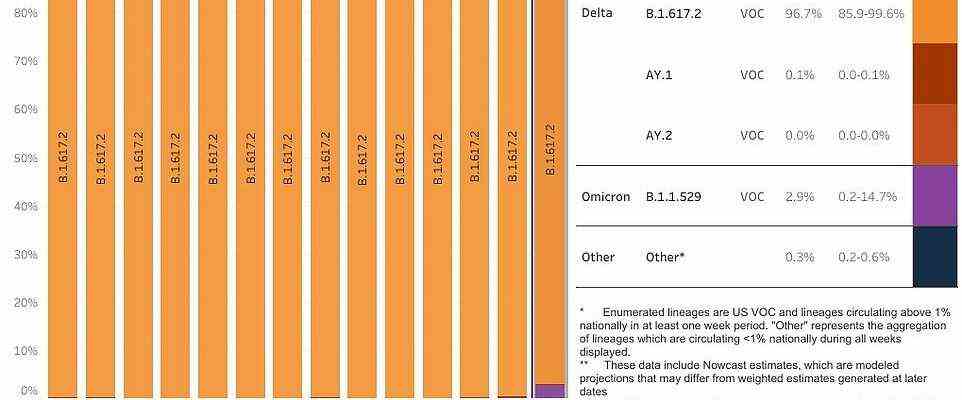Omicron cases in the United States have jumped seven-fold in a week, the CDC revealed, with data from states showing confirmed infections with the new COVID variant jumped 27 per cent in the last 24 hours, from 189 to 241.
On Tuesday, the CDC said Omicron is now estimated to account for 2.9 per cent of all Covid cases, up from 0.4 per cent a week ago, meaning the true number of infections from the new strain likely numbers in the thousands.
Meanwhile, CDC Director Dr Rochelle Walensky said Omicron comprises up to 13 per cent of new infections in New York and New Jersey, with the variant now confirmed to have been found in 36 states, as well as Washington DC.
Experts recently warned a ‘tidal wave’ of Omicron is headed to the US, with the UK recording its biggest one day diagnosis total – 78,610 cases on Wednesday, 10,000 of which were the new variant, giving Americans a likely preview of what’s to come.
According to most recent data gathered by BNO – which scrapes data from local health departments nationwide – cases of the variant have jumped to 241, up by 52 cases from Wednesday.
Overall, cases in the U.S. are continuing to grow, up 46 per cent over the past two weeks to 121,687 per day. More than 67,000 people are in the hospital with the virus every day as well, up 22 per cent over the past two weeks. Deaths are nearing the 1,300 per day mark as well, up 40 per cent.
As of 11 am on Wednesday, Johns Hopkins reports that 50,251,149 Covid cases and 800,867 deaths have been recorded in the United States since the pandemic first began in March 2020.
One of the largest known outbreaks of Omicron in the world so far has occurred at Cornell University, in Ithaca, New York. The school has reported 930 Covid cases in recent days, with almost all of the cases sequenced found to be of the new variant. Cornell has refused to say exactly how many of its diagnoses are Omicron, with US officials generally sequencing one in five PCR tests to determine which Covid variant a person has bee infected by.
School officials also report that all of the confirmed Omicron cases so far – for which they have not yet given a confirmed number – are in students who are fully vaccinated, and some have been boosted too. The school has closed campus as a result, and finals for the fall semester will now be held virtually.
The Omicron COVID-19 variant (purple) now accounts for 3% of U.S. Covid cases, up from less than one percent last week. The Delta variant (orange) is still the nation’s dominant strain, accounting for 97% of new cases, per CDC data
Experts believe that people who are fully vaccinated have little protection against infection from the new variant, although preliminary data suggests vaccines do still prevent serious illness. Early data shows that the booster shot is required to lower the chances of infection from Omicron, with a Pfizer booster found to cut the risk of infection by about 70 per cent.
According to CDC data, though, only 16.5 per cent of Americans – and less than a fourth of fully vaccinated people – have received the additional jab, meaning hundreds of millions of people have effectively no protection against the variant.
There are also fears that other Covid treatments, like some of the monoclonal antibody cocktails used on people already infected with the virus, may be less effective against the new strain. Early data also shows the one-shot Johnson & Johnson vaccine may not be effective against the mutant strain.
Dr Jacob Lemieux, a post-doctoral researcher at Harvard University, warns that things will only get worse going forward as well.
‘Our delta surge is ongoing and, in fact, accelerating. And on top of that, we´re going to add an omicron surge,’ said Dr Jacob Lemieux.
‘That´s alarming, because our hospitals are already filling up. Staff are fatigued,’ leaving limited capacity for a potential crush of COVID-19 cases ‘from an omicron wave superimposed on a delta surge.’
Meanwhile in the UK, confirmed Omicron cases surpassed 10,000 on Wednesday, nearly doubling from the day before, as the Covid plagued islands prepares for the outbreak to worsen over time. Prime Minister Boris Johnson supercharged the countries booster shot rollout in an effort to protect his citizens.
Sequencing in the country confirms that the new strain accounts for around 40 per cent of new cases.
The situation across the pond is only worsening, though, and some even fear that the country will have to reenter lockdowns in the new year to control the rampant Omicron spread. London in particular has been struck, with the variant becoming the dominant strain in the nation’s capital.
In other parts of Europe, both Denmark and Norway continue to struggle with Covid outbreaks of their own. Both countries set new Covid records this week and have sequenced over 1,000 cases of the new variant.
European Union officials are sounding alarms as well, saying that the variant could be the continent’s dominant strain by mid-January.
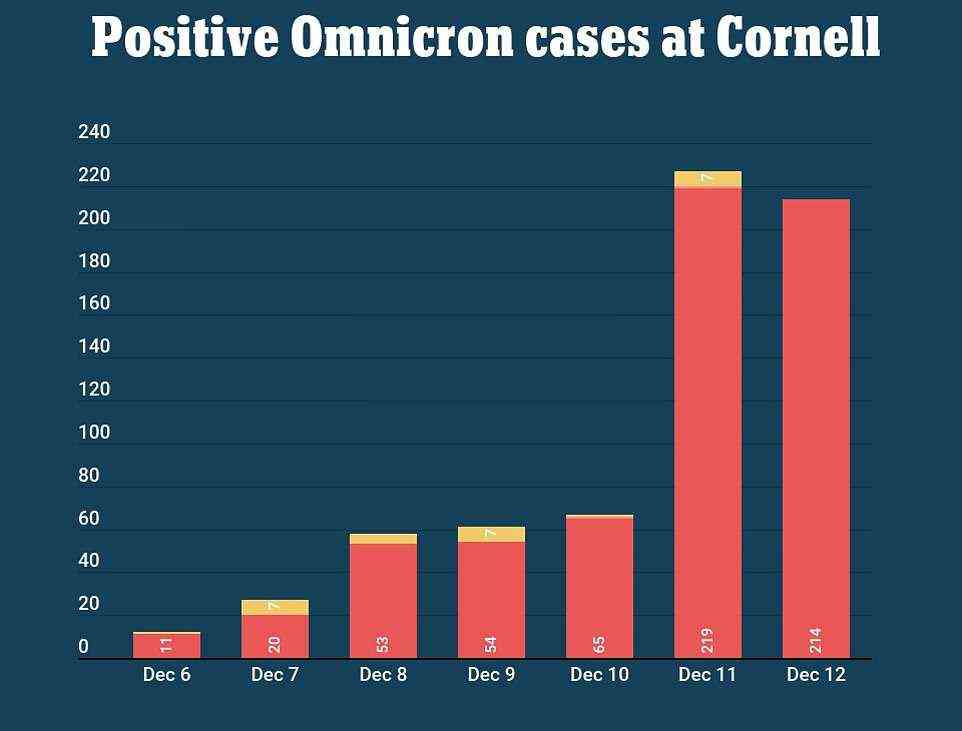
Cornell University in Ithaca, New York, is the site of what is believed to be the first major COVID-19 outbreak to hit the U.S. More than 900 students and staff have tested positive for the virus over the past week, with officials reporting that almost all of the cases investigated have indicators of the Omicron variant. All of the Omicron cases are among people who are fully vaccinated, the school reports. Pictured:
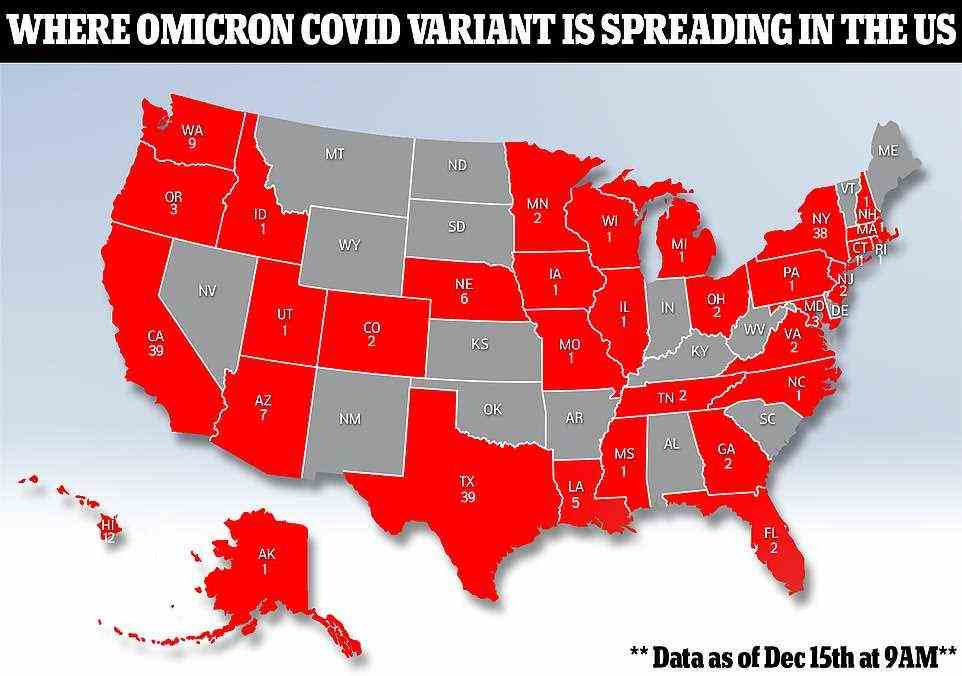
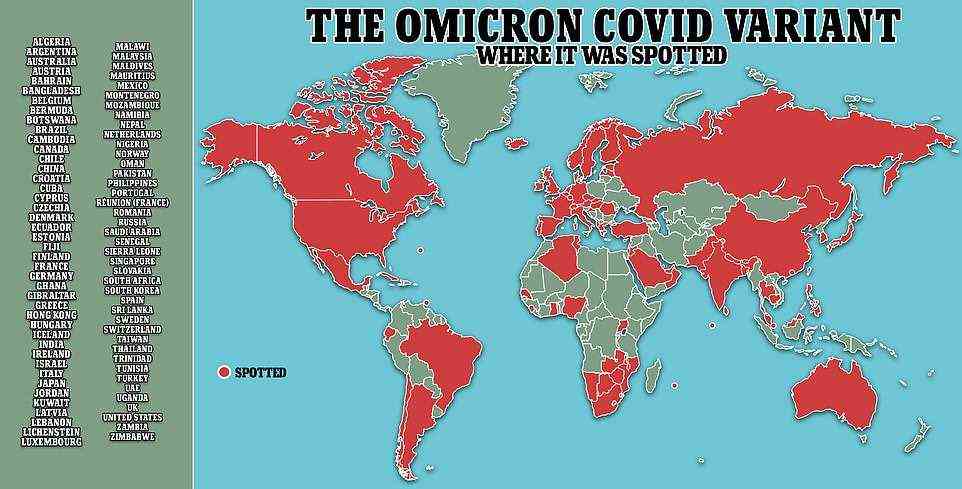
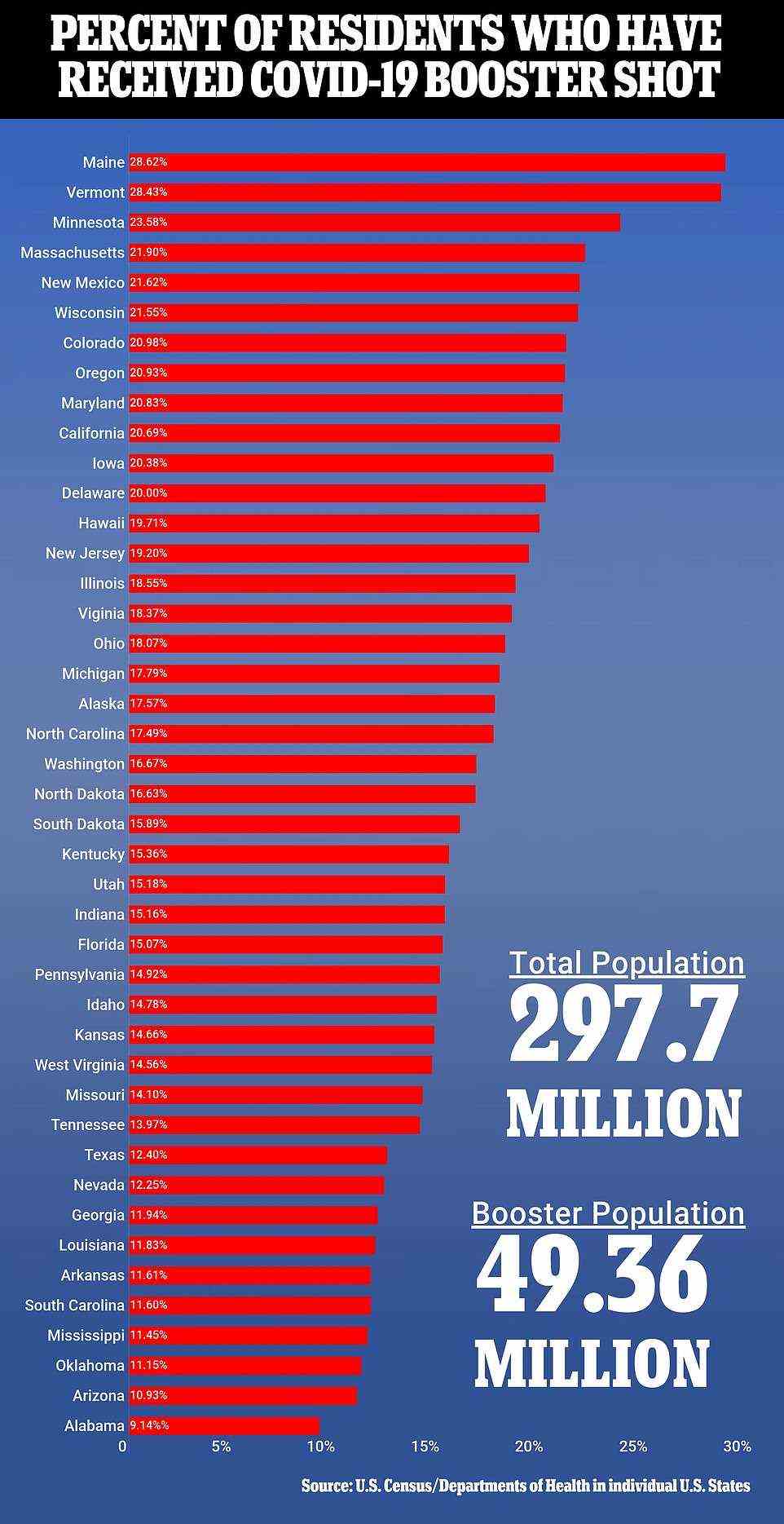
As of Monday, only 16 percent of Americans had received their COVID-19 booster shots, with no state having more than 30% of its population boosted
Cornell University looks to be the site of America’s first major Omicron outbreak.
The Ivy League school has recorded 930 positive Covid tests since December 7, per the school’s Covid dashboard, including 883 cases among students.
This outbreak is despite 97 per cent of on-campus students, faculty and staff being fully-vaccinated.
Cornell collected many of these positive test samples, and its surveillance program detected that almost all of the samples have indicators of the Omicron variant.
The new virus strain was first detected by South African officials last month, and preliminary data shows it is highly infectious and has the ability to evade protection provided by the vaccines.
It is the most mutated Covid strain yet, with 50 total mutations, including 30 on the spike protein
An Israeli study from earlier this week found that people who have only received the basic vaccine series – or who would typically be considered fully vaccinated – are still vulnerable to infection from the new variant.
The same study found that receiving a booster shot would re-establish protection, though.
A promising study came out of South Africa this week, though.
The study, performed by Discovery Health – the nation’s largest health insurer, finds that the variant spreads much faster that previous virus strains, and can circumvent protection provided by the Pfizer Covid vaccine – the most popular jab in the U.S.
Researchers did find that effects of the strain are relatively minor, though, and are unlikely to cause hospitalization or death, though. People infected with Omicron are 20 per cent less likely to be hospitalized than they would be if they caught the Delta variant, the study found.
Professor Chris Whitty, England’s chief medical officer, warns that South African data may not be translatable to the UK, though, since his country was not his as hard by Delta as some others were.
He said: ‘I think there has been a certain amount of commentary about the fact that doctors and scientists from South Africa… have indicated that there may be some reduction in the hospitalization rates they are seeing with Omicron. I want to put a really serious caution on this because I think it has been overinterpreted.
‘The amount of immunity for this wave because of prior Delta wave and vaccination is far higher than it was for their last wave and, therefore, the fact they have a lower hospitalization rate this time is unsurprising.
‘That doesn’t mean there is some degree of milder disease — that is possible — but I think there is a danger that people have overinterpreted this to say this is not a problem and there’s nothing to worry about. I want to be clear, I am afraid this is going to be a problem.’
This also comes as cases and deaths begin to spike in the U.S., with some states particularly in the Northeast getting hammered by a post-Thanksgiving Covid wave.
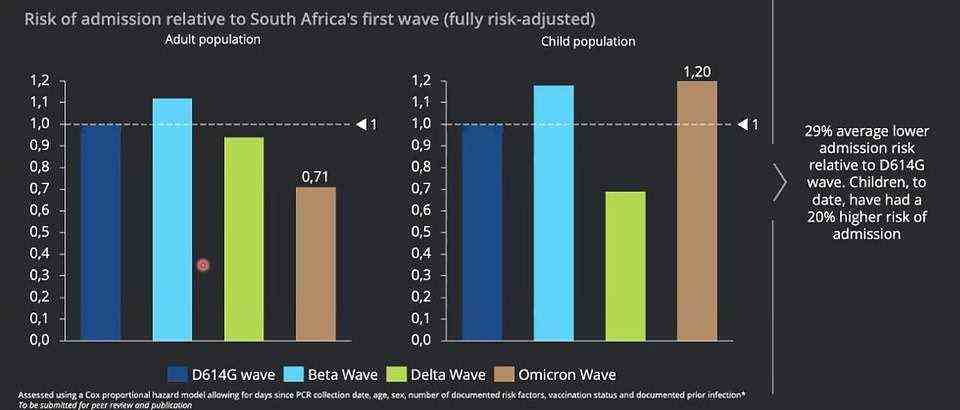
Officials who looked at 78,000 Omicron cases in the past month found t he risk of hospitalization was a fifth lower than with Delta (in green) and 29 per cent lower than the original virus (dark blue). Omicron is shown in brown and the original South African ‘Beta’ variant in light blue. Children appeared to have a 20 per cent higher risk of hospital admission with complications during the new wave than the initial outbreak, despite the numbers still being tiny
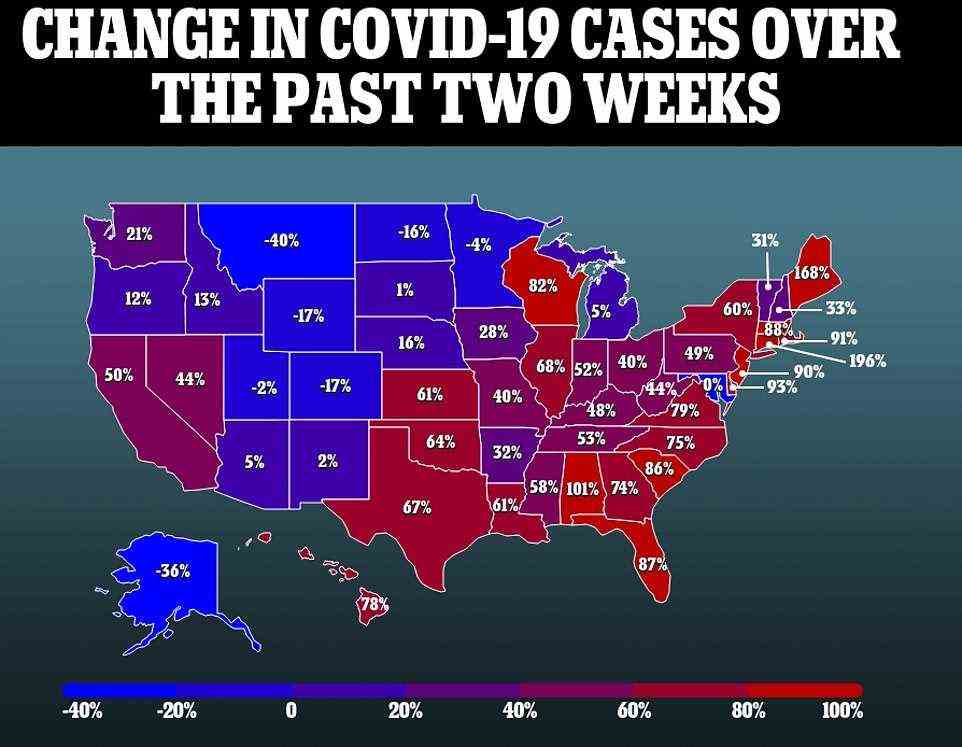
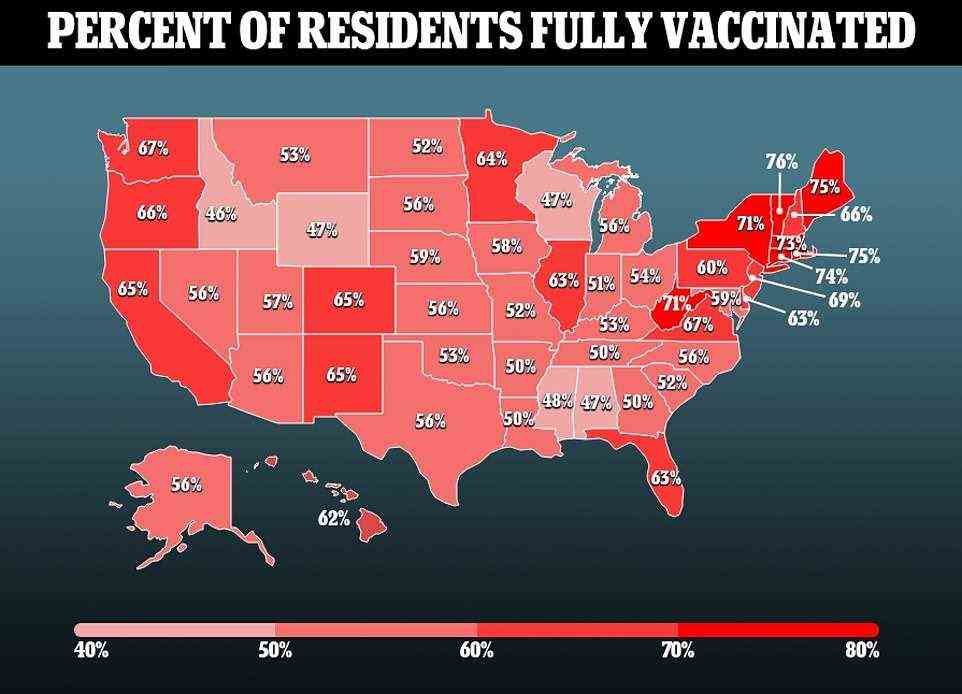
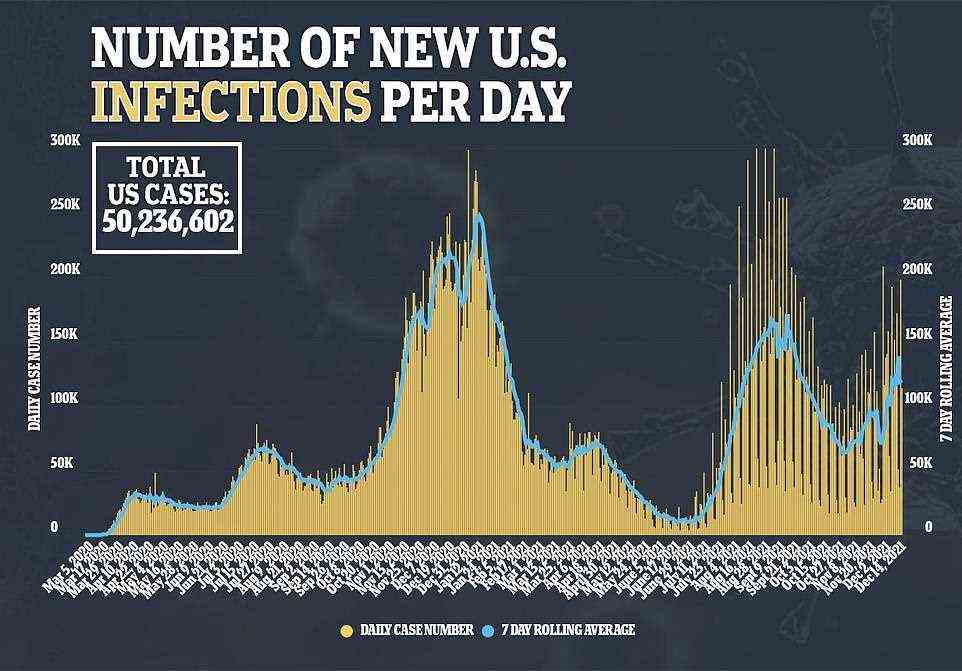
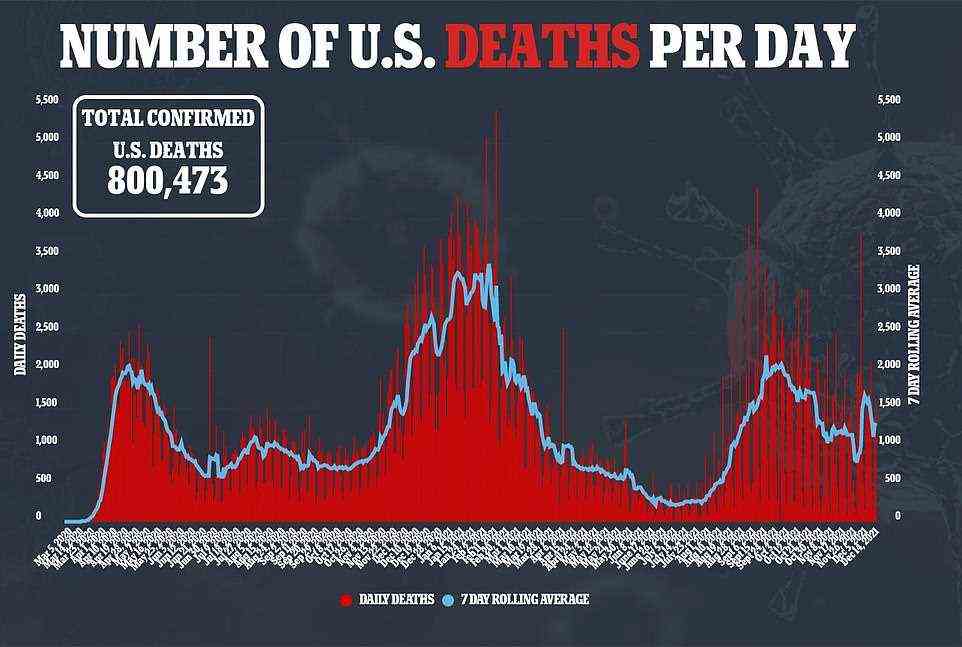
Connecticut is experiencing the worst surge, with cases nearly tripling over the past two weeks. Around 71 of every 100,000 residents of the state are testing positive for the virus every day.
Nearby Maine (168 per cent increase in cases over the past two weeks), Delaware (93 per cent), Rhode Island (91 per cent), New Jersey (90 per cent) and Massachusetts (88 per cent) are also among the leaders.
Alabama has also experienced a doubling in new cases over the past two weeks, signaling that this recent winter surge is starting to take hold in the south as well.
A vast majority of these new cases are still of the Delta variant, though, as the strain that has dominated much of the second half of 2021 still makes up 97 per cent of sequenced cases in the U.S.
Despite the recent surge, Dr Anthony Fauci, the nation’s top infectious disease expert, said Wednesday during a news briefing that a Omicron specific booster was not yet necessary.
‘Our booster vaccine regimens work against Omicron. At this point, there is no need for a variant-specific booster,’ Fauci said.
‘However, if you look at two weeks post the third dose, note the substantial degree of elevation of the neutralizing title; well within the range of neutralizing Omicron.’
Across the pond, the UK has recorded 10,017 confirmed cases of the variant as of Wednesday morning, and the recent case surge has many fearing the worst.
Cases in the nation are starting to spike as well, the the country recording 59,610 cases per day – a 30 per cent increase over the past two weeks.
On Wednesday, a new record was set with 78,160 positive Covid tests logged by the nation.
Deaths have actually decreased, though, with the nation averaging 150 per day – down 6.5 per cent from 180 per day being recorded two weeks ago – potentially a sign of how mild the variant can be.
Death figures do often lag behind case figures, though, meaning a mortality spike could be on the way as well.
In an effort to curb the recent surge in cases Prime Minister Johnson enacted strict masking and work from home measure last week. Some events and venues will also now require either proof of vaccine or a recent negative test to enter.
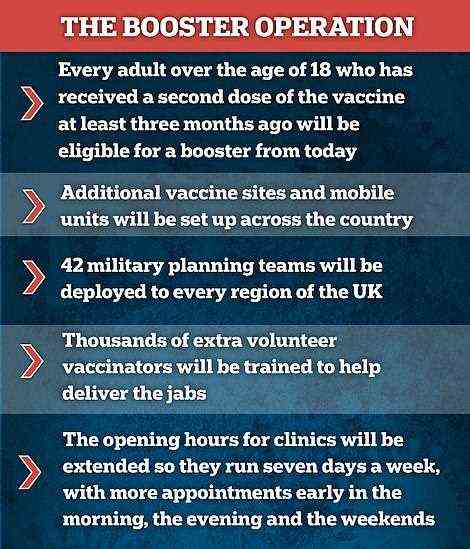
He has also enlisted the military and a thousands-strong volunteer force to speed up the rollout of Covid boosters, and also has extended the hours of clinics nationwide to keep up with booster demand.
Some fear it will not be enough, though, and that lockdowns could be around the corner in 2022 if the surge continues to worsen.
Denmark has recorded the second highest total of Omicron COVID-19 cases of any nation, with 6,047 sequenced as of Wednesday morning – a 2,000 case jump from yesterday.
One of the largest Omicron outbreaks in the world has been tied to a Christmas lunch event in the Viborg region, attended by 150 students on November 27 from two local high schools.
Around 70 cases of the variant have been tied to the event so far.
The country is following the UK in prioritizing the booster shots in an effort to limit the spread of the new variant.
Starting Monday, booster shots will be available to all Danes 40 years or older, hoping to first protect the most vulnerable citizens in the rollout of the shots.
Prime Minister Mette Fredericksen announced new measures to prevent spread of the virus last week, joining the UK.
People who can will now be ordered to work from home, and virtual schooling has been extended as well.
Bars and nightclubs will also have reduced operating hours, being forced to close at midnight now, in an effort to prevent transmission.
Still health officials still fear the variant will continue to spread in the European nation, and the country’s health authorities said Monday they expect Omicron to be the dominant strain in Copenhagen, the nation’s capital and largest city, by the end of the week.
The Nordic nation has now is now recording 6,846 new cases every day, almost double the previous record set by the country last winter.
Fearing a similar outbreak happening within its own borders, Israel restricted travel from both the UK and Denmark on Monday, adding the two European nations to a list of about 50 others.
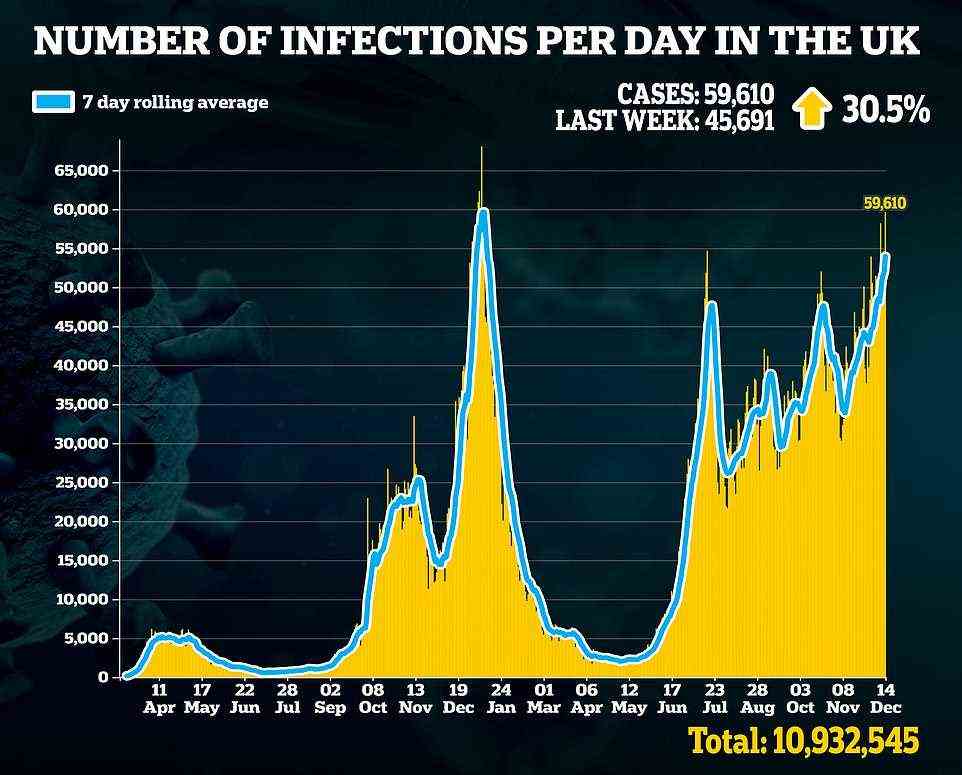
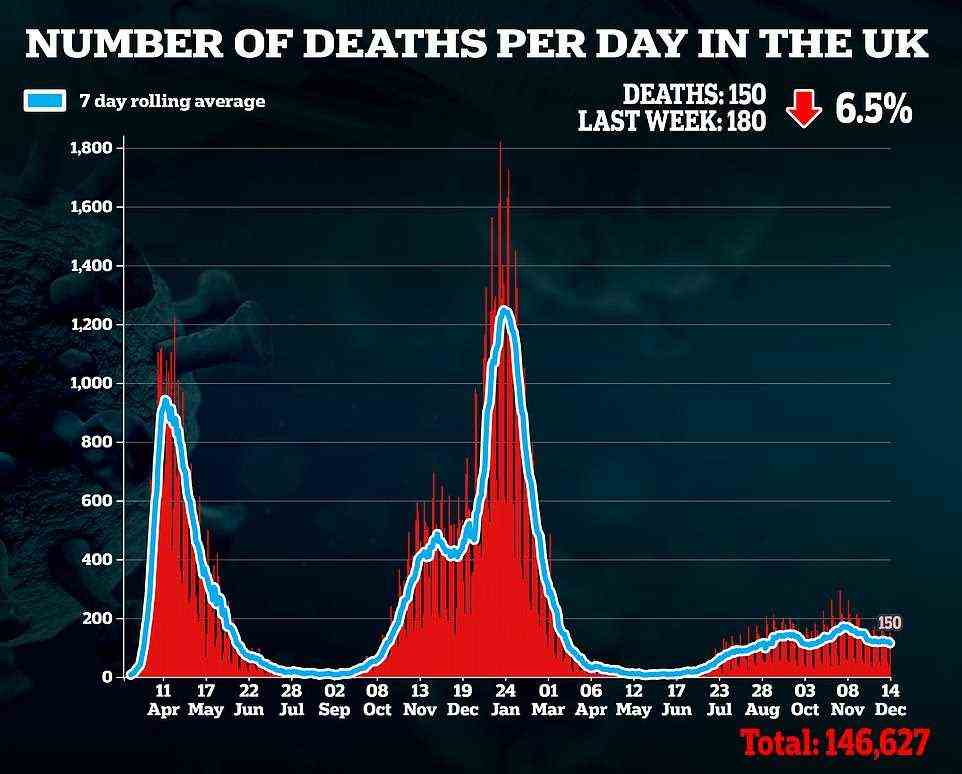
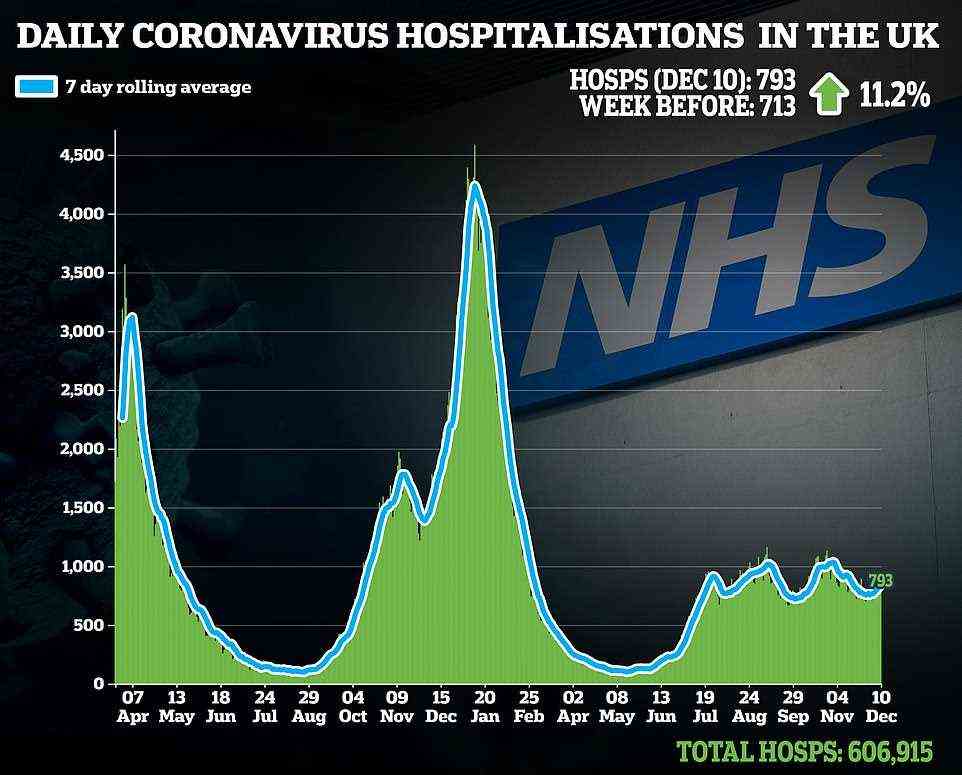
It is the first country to ban travel from the UK and Denmark due to the Omicron variant.
Meanwhile in the U.S., President Biden banned travel from eight African countries, some of which are not suffering major Covid outbreaks at the moment, but still allows incoming travel from the UK and Denmark.
Norway suffered the first known outbreak of the Omicron variant, when a holiday party held by locally based energy company Scatec was tied to over 100 cases of Covid – with more than a dozen confirmed to be the new strain.
The company traveled to Cape Town, South Africa, in mid-November, before the discovery of the new strain.
At the party it is believed one person, dubbed ‘patient zero’, is at the center of the outbreak, with all cases being tied back to him.
After the party, company employees mingled with others at the restaurant it was being held at, and it is believed that over 50 more people who were not a part of the event contracted the virus then.
In the time since, cases in the nation have surged, reaching an all-time record of 4,856 per day on Wednesday.
To control the virus, Prime Minister Jonas Gahr Stoere announced the country would enter a partial lockdown, banning the serving of alcohol in bars, closing gyms and swimming pools, and other mandates.
A promising sign, though, is that none of the people tied to the Cape Town even suffered severe complications caused by the virus, and no deaths or hospitalizations have been tied to the event.
In South Africa, the nation where the variant was first detected, has reached a new record of over 21,000 Covid cases per day this week.
Nationwide, the amount of people admitted to the hospital for Covid has increased ten-fold over the last four weeks, from 562 to more than 5,900 last week.
While officials in the country report that Omicron cases are relatively mild, many people in the Covid plagued nation are still suffering serious enough cases to require the additional care.

